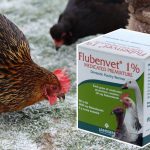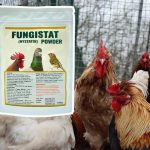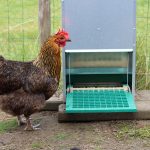Why Does My Chicken Sleeps During The Day?
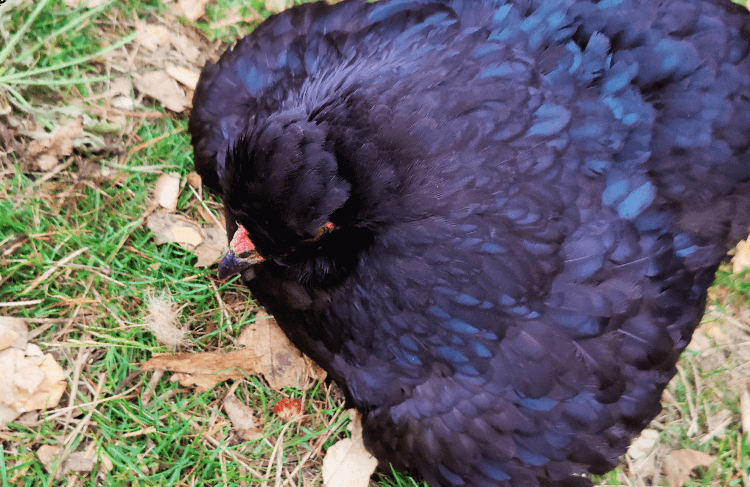
Chickens are creatures of habit. They roost between dusk and dawn, no matter what time of year it is, and will never oversleep or stay up late. But what if your chicken starts to sleep for an extended period during the day? Should you worry something is up with your bird? Let’s address the most common reasons why your chicken sleeps during the daytime.
- Depression/boredom
- Not enough nighttime sleep
- Heatwave
- Mites and lice
- Intestinal parasites
- Eggbound
- Diseases
Depression / Boredom
Chickens are intelligent creatures that need to be entertained or challenged to keep them busy and to prevent them from getting into mischief. Adjusting their coop and run environment can help them be happier and less stressed.
Ensure the coop and run size are big enough so it doesn’t get overcrowded. If you want to know the minimum requirements for a chicken run and coop, check out our ‘Coop Size Calculator’.
Provide enough dust baths, so there are enough for all chickens to bathe and relax. They love to spend time in the dust bath, it’s their way to stay clean, and it’s also a social event in the flock. You’ll notice your chickens like to take dust baths simultaneously.
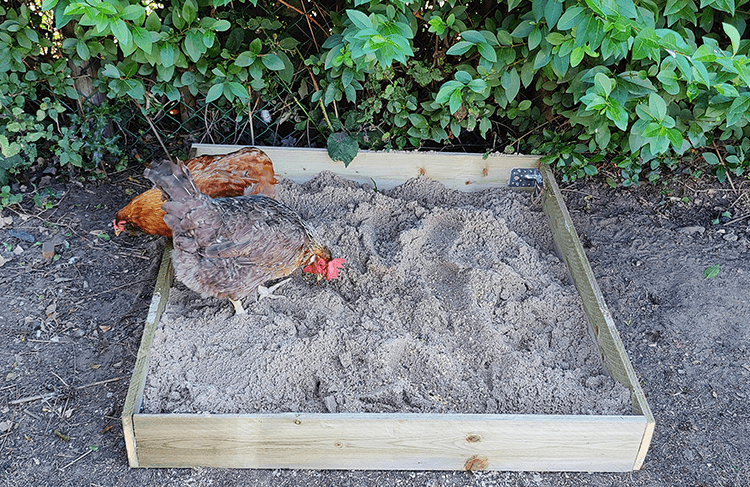
Make your chickens’ work’ for their food. Hide snacks in the dirt or spread them around the run. Make a cabbage or lettuce pinata, so they’ll have to jump to reach the tasty snack.
Plenty of chicken toys can be found online, like ladders, swings, and food balls,… But overall, you don’t need to spend much money on chicken entertainment as chickens are happy with plenty of space, companionship, dust baths, and food.
Not Enough Nighttime Sleep
Various circumstances can cause a bad night’s rest and make your chickens more sleepy than usual during the day. Try not to make loud noises near the coop, especially after dusk, nor shine bright lights near the coop. These factors can be beyond your will as you could be dealing with loud neighbors or live near a railroad.
So, a good night’s rest depends on external factors like weather conditions, noises, artificial light near the coop, or chicken health issues like molting. But, as a chicken keeper, there are basic rules to follow to help them sleep well:
- Don’t let them roost on an empty stomach
- Clean and ventilate the coop
- Provide plenty of space inside the coop
- Provide enough roosting bars
Heatwave
Tropical days are unpleasant for many animals, including chickens. They take temperature changes reasonably well but stand cold temperatures better than hot ones. The most pleasant temperature for a chicken is around 75 degrees Fahrenheit (24°C) or below, but temperatures can rise well above 100 degrees F during a heatwave or sweltering summer.
Chickens won’t be very active and just lay in a shady spot until the hottest hours have passed. While dust bathing or just laying around, they commonly take a nap and close their eyes regularly.
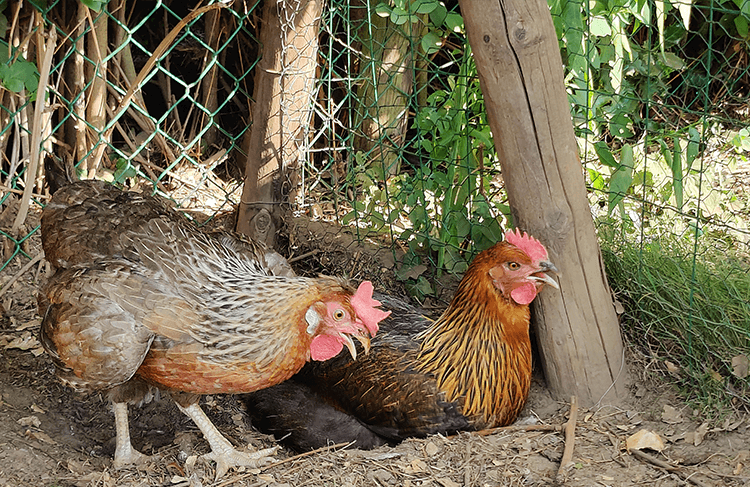
There are many things you can do to keep your chickens cool during summer, but these are essential:
- Provide plenty of clean, cool water
- Provide shady spots
- Ventilate the coop
- Install dust baths
- Clean out the coop regularly
Mites and Lice
A mite or lice infestation is not uncommon in a backyard chicken flock but is very hard to eradicate. Chickens that suffer from this kind of infestation show signs of listless, lethargic behavior and an overall sick look.
Lice are found on the chicken’s body, unlike mites that hide during the day and are seldom seen on the chicken’s body. When you think you have a mite or lice problem, thoroughly examine your chickens and coop for any signs of these parasites and start treatment immediately.
There are numerous products on the market to treat lice and mites infestations, but be careful which one to buy and do some research. Chicken owners around the world mainly use these products:
Ivermectin: Very popular due to its easy use, fair price, and high success rate. But be very careful with giving the correct dose to your chickens, and beware not to eat the eggs for at least four weeks.
Elector PSP: The significant advantage of Elector PSP is that it has no egg withdrawal period. It’s rather pricey but effective and not harmful to chickens.
Permethrin: This product is both medication and an insecticide. It can be used on both your chickens and the coop. The price is relatively low, and the success rate is high. But Permethrin is toxic to cats, so don’t use this product if you own pet cats or have neighbor cats who visit your flock.
Intestinal Parasites
Several types of intestinal parasites can affect chickens:
- Roundworms
- Tapeworms
- Cecal worms
- Coccidia
- Threadworms
Birds become infected by eating eggs or larvae from the ground or eating intermediate hosts like earthworms. Eggs can survive months in the soil and can be transmitted through clothes and shoes.
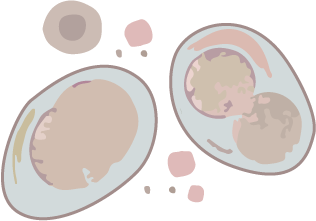
Tapeworms, threadworms, and roundworms target the intestines and live in the intestinal lining. They cause inflammation of the intestines (enteritis) and mucus. Cecal worms can bring in a parasite, causing blackhead disease in chickens. In the case of Blackhead disease, chickens have rather sulfur-colored droppings due to liver damage.
To learn more about all types of poultry worms and how to keep them at bay, check our article on worms in chickens. Coccidia is not worms: they are another type of parasite that causes Coccidiosis in chickens.
To confirm whether your chickens have an intestinal parasite problem, check their droppings or take a sample to the vet for a fecal exam. Droppings should not be bloody, liquid, or yellow. If you notice these symptoms and your bird also looks pale, has lost her appetite, has lost weight, and seems to have ruffled feathers, a trip to the vet seems necessary.
Eggbound
Eggbound is common in chickens, especially young laying hens or obese chickens. It can be life-threatening and become an emergency situation when not noticed or treated immediately. Egg bound occurs when a hen has an egg stuck in her oviduct, so the egg is physically stuck inside her body, and she can’t push it out.
A blockage caused by a stuck egg can be fatal when not treated. However, several easy measures can be taken when noticed in an early stage to help pass the egg to the outside.
Symptoms of an eggbound chicken:
- Frequently inside the nesting box
- Tail wagging
- Abdominal straining
- Sleeping or resting on the ground (not roosting)
- Depressed look
When dealing with an eggbound hen, there are several treatments to follow.
- Provide extra calcium
- Separate the eggbound hen from the flock
- Bathe her in lukewarm water
- Massage the hen’s abdomen
- Visit the vet if the situation doesn’t improve
To prevent your hens from being eggbound, always provide plenty of oyster shells as a calcium supplement. Don’t use artificial light inside the coop during the winter months to increase egg production.
Diseases
As mentioned before, internal parasites and worms can cause your chicken to be sleepy or non-active during the day. These parasites can also cause diseases such as Coccidiosis or Blackhead disease. But truth be told, numerous conditions can cause your chicken to be sleepy, lethargic, or non-active during the daytime. It’s just one of many symptoms of most common chicken diseases.
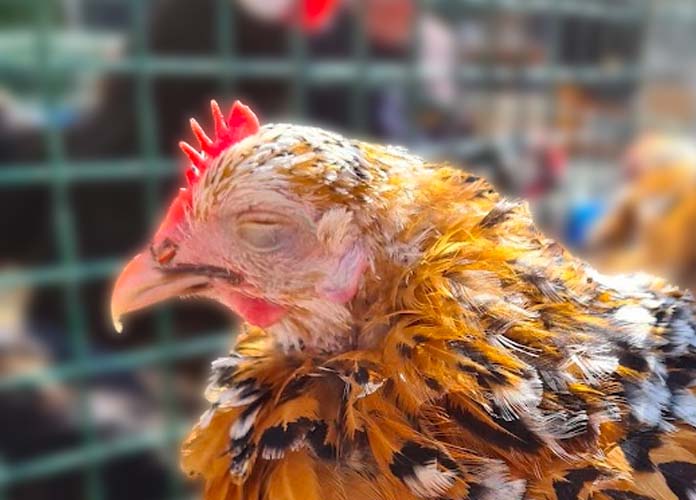
Possible other diseases are:
- Chronic respiratory disease
- Avian influenza
- Heart failure
- Ovarian tumors
- Aflatoxicosis
Consult your vet when other symptoms, next to the lethargic behavior, are noticed.
Summary
If your chicken frequently takes a nap during the daytime and seems happy and healthy, there is no need to worry. It’s not uncommon for chickens to sleep during the day. But other issues are possible when they start to sleep most of the day and seem unhealthy and scrappy. Regularly check your chickens for other symptoms and causes, like a mite or lice infestation or worms. Provide plenty of space inside the coop and, during a heatwave, give them loads of fresh water and shade. If your chicken seems sick, try to rule out egg binding by examining her. Always consult your vet when other symptoms are noticed.
